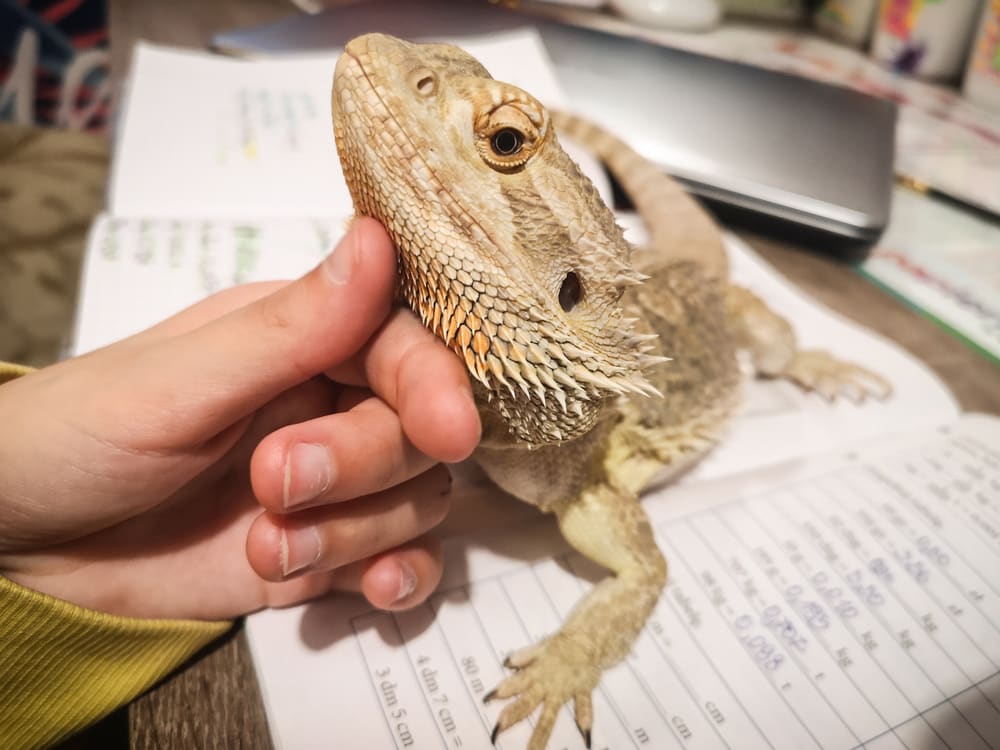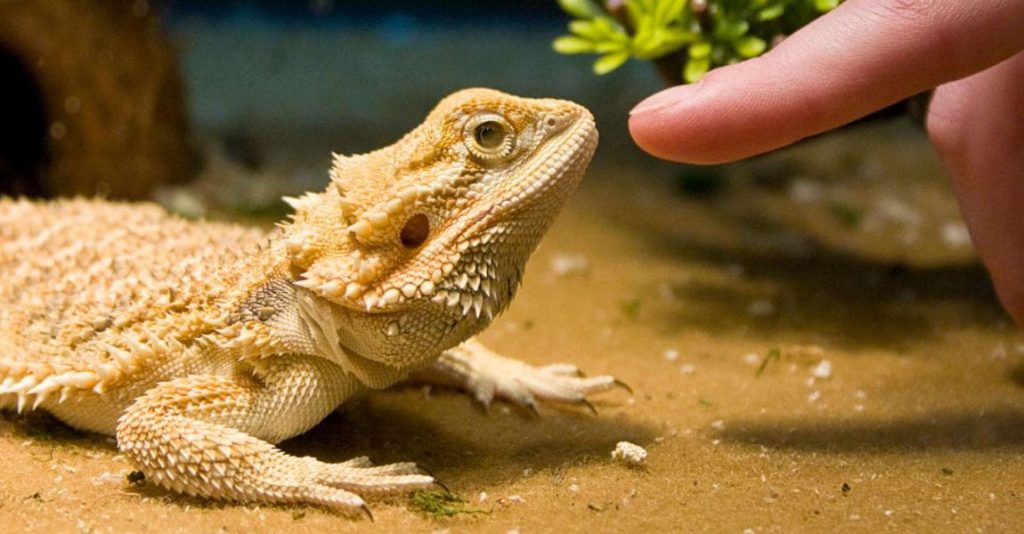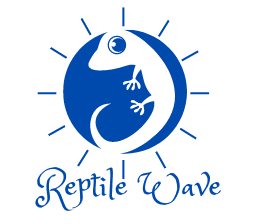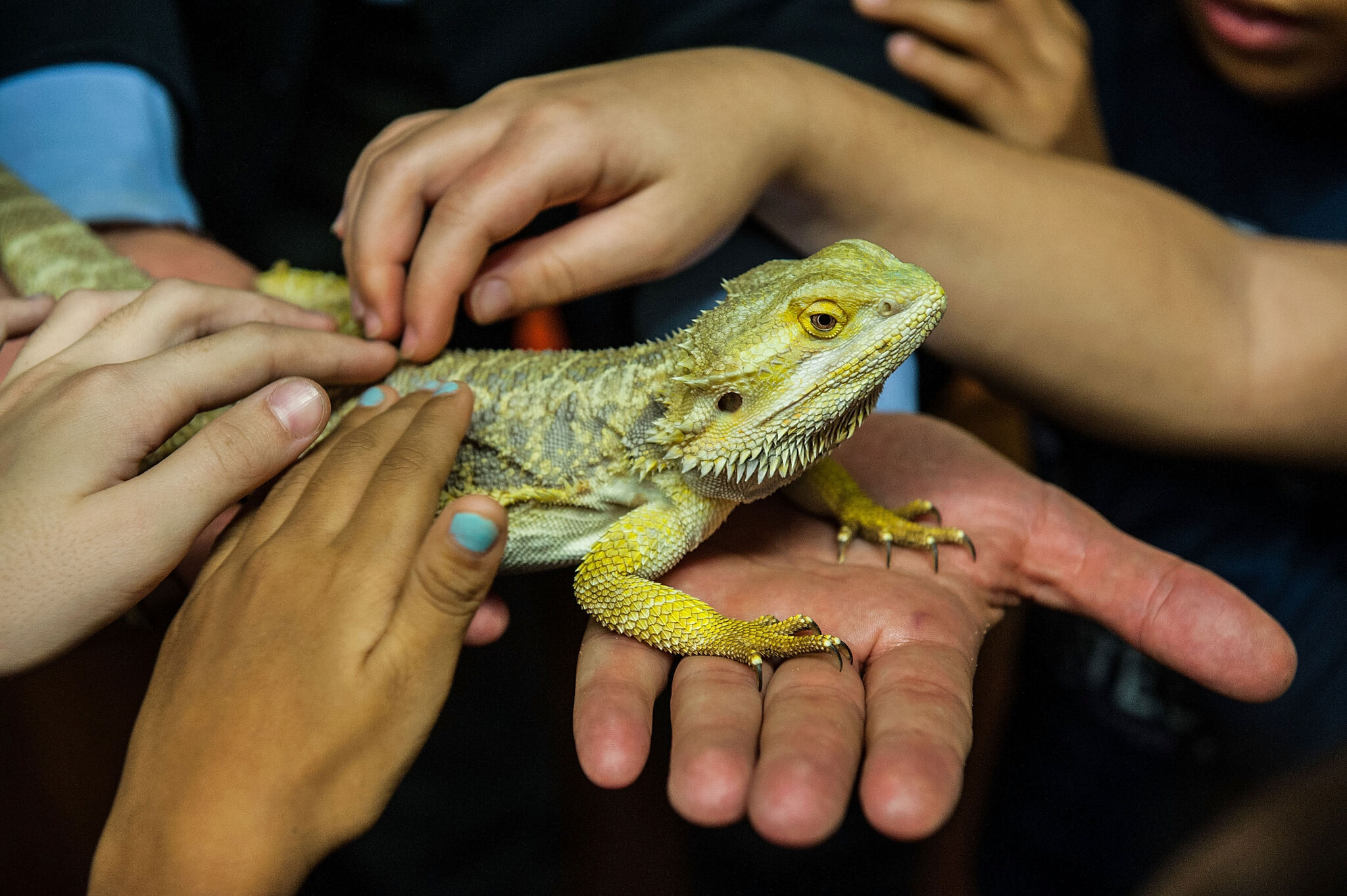Yes, bearded dragons are affectionate companions. They show affection in their own special way, which is different from dogs or cats. These friendly reptiles like being with their owners and feel happy when held or spending time together. They might cuddle up to you, lick your hand, or make happy sounds to show they like you.
Taking care of your dragon and spending time with it can make your bond stronger. You can make bearded dragons loving with patience and kindness, even if they like being alone sometimes.
Each dragon has its own personality. So, it’s important to understand and care for them in their own way to build a loving relationship.
Are Bearded Dragons Affectionate? Signs of affection

Bearded Dragons express their affection in various ways. Here are a few signs you may notice sometimes
Body language
Bearded dragons communicate a lot through their body language. When they are feeling affectionate, they show some behaviors. A happy and affectionate bearded dragon usually has a relaxed body. Its legs are comfortable, and its tail isn’t stiff.
In some cases, when a bearded dragon bobs its head in slowly, it might mean it recognizes and acknowledges its owner. Moreover, when bearded dragons puff out their beard, it usually means they’re being defensive or aggressive.
But sometimes, if they’re calm and not acting defensively, puffing out their beard can be a way of showing affection.
Vocalizations
Bearded dragons are not particularly vocal creatures. But they can make subtle sounds to express their emotions. These soft sounds usually mean the bearded dragon is happy and relaxed. They might make these sounds when their owner pets or holds them.
Hissing or clicking sounds usually mean the bearded dragon is upset or uncomfortable. But sometimes, if they’re calm and relaxed, these sounds might be a way for them to communicate with their owner.
Interactions with their owner
Friendly bearded dragons may follow their owner around, seeking closeness and attention. When touched or held, some bearded dragons lean in, showing they enjoy the attention.
How do bearded dragons show affection?
Bearded dragons show affection by wanting to be close to their owner. They gently nuzzle or lick them. They may also make soft sounds when they feel content and relaxed.
Let’s have a look in detail how they generally show their affection to their owners.
Nuzzling or licking
Bearded dragons may affectionately rub against their owner’s hand or face. This behavior is a way for them to seek comfort and establish a bond with their human companion.
Some bearded dragons also lick their owner’s hand or arm. This is a form of grooming, showing trust and affection.
Purring or chirping
Affectionate bearded dragons might make soft chirping or purring sounds when they’re calm and relaxed. These gentle vocalizations are a way for them to communicate their happiness and enjoyment of their owner’s company.
Wanting to be close
Bearded dragons may actively seek out physical contact with their owner as a way to express affection. They might climb onto their owner’s lap or shoulder, and snuggle against their chest. Also, they can hide in their owner’s clothes to feel safe and warm.
When a bearded dragon seeks physical contact with its owner, it’s a sign that it feels safe and happy with them. And they are enjoying their time together.
How to Bond With Bearded Dragons?

When you want to have a bond with your beardie, it requires patience, consistency, and gentle interactions with them. Here are some steps to help you form a strong connection with your beardie
- Regular Interaction: Try to spend time with your bearded dragon each day, gently handling them, petting them, and talking to them. This helps them become familiar with your presence and associate you with positive experiences.
- Hand-Feeding: Offer food from your hand to your bearded dragon. It will help you make a strong bond and gain trust. It also helps them feel comfortable coming to you on their own and strengthens your bond.
- Respect Their Space: Be mindful of your bearded dragon’s body language and preferences. Let them come to you when they feel like it, and understand when they want alone time in their hiding spots.
- Create a Stimulating Environment: Make sure their home has hiding spots, things to climb on, and different types of ground to explore. This keeps your bearded dragon happy and active. Also, it makes your bearded dragon feel safe
- Rewarding good behavior: Give them treats or praise when they act well, like being calm, curious, or spending time with you. This helps strengthen your bond and leads to more happy moments together.
- Be Patient and Consistent: Building trust and love takes time. So, be patient and consistent in your interactions with your bearded dragon. Over time, they will become more comfortable and affectionate towards you.
How Do You Know If Your Bearded Dragon Doesn’t Like You?
If your Bearded Dragon doesn’t like you, they might show it in a few ways. First, they might hide or stay away from you. This could mean they’re scared or uncomfortable around you. Second, they might act defensively by puffing up their beard or hissing. This is their way of saying they feel threatened. Third, they might try to run away when you try to hold them. If they don’t like being touched by you, they’ll try to escape.
Also, if they suddenly stop eating when you’re nearby, it could mean they’re not happy with you. Lastly, if they bite, whip their tail, or change color, it’s a sign they’re feeling stressed or scared. These are all ways your Bearded Dragon might tell you they’re not happy with you.
FAQs
Below, you’ll find responses to some of the questions you commonly ask.
It’s not advisable to kiss or snuggle your bearded dragon. It can spread Salmonella germs, potentially making you sick.
No, holding a Bearded Dragon shouldn’t hurt if done correctly. Support their body and avoid squeezing or gripping tightly.
Yes, if your Bearded Dragon chooses to sleep on you, it’s a sign of trust and comfort. They feel secure in your presence.
To cheer up your Bearded Dragon, offer new toys. Ensure warmth and spend quality time with gentle handling and treats.
Routine, warmth, and safe hideouts in their habitat calm bearded dragons.
Bearded Dragons don’t show love like people do. However, when they trust you, stay calm, and want to be near you, it shows they like you.
Bearded dragons lift their tail for communication and to regulate body temperature.
Closing their eyes while being petted signifies relaxation and contentment. It’s a positive response!
Final Thoughts
Bearded dragons are affectionate companions, showing their love uniquely. They enjoy being with their owners. They cuddle, lick, or make happy sounds to express their happiness.
To become close with bearded dragons, you need to be patient and understand their unique personalities. With care and time, you can build a strong friendship with them.

